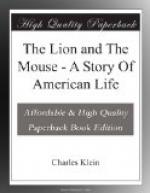The boulevards were crowded, as usual at that hour, and the crush of both vehicles and pedestrians was so great as to permit of only a snail-like progress. The clumsy three-horse omnibuses— Madeleine-Bastille—crowded inside and out with passengers and with their neatly uniformed drivers and conductors, so different in appearance and manner from our own slovenly street-car rowdies, were endeavouring to breast a perfect sea of fiacres which, like a swarm of mosquitoes, appeared to be trying to go in every direction at once, their drivers vociferating torrents of vituperous abuse on every man, woman or beast unfortunate enough to get in their way. As a dispenser of unspeakable profanity, the Paris cocher has no equal. He is unique, no one can approach him. He also enjoys the reputation of being the worst driver in the world. If there is any possible way in which he can run down a pedestrian or crash into another vehicle he will do it, probably for the only reason that it gives him another opportunity to display his choice stock of picturesque expletives.
But it was a lively, good-natured crowd and the fashionably gowned women and the well-dressed men, the fakirs hoarsely crying their catch-penny devices, the noble boulevards lined as far as the eye could reach with trees in full foliage, the magnificent Opera House with its gilded dome glistening in the warm sunshine of a June afternoon, the broad avenue directly opposite, leading in a splendid straight line to the famous Palais Royal, the almost dazzling whiteness of the houses and monuments, the remarkable cleanliness and excellent condition of the sidewalks and streets, the gaiety and richness of the shops and restaurants, the picturesque kiosks where they sold newspapers and flowers—all this made up a picture so utterly unlike anything he was familiar with at home that Jefferson sat spellbound, delighted.




